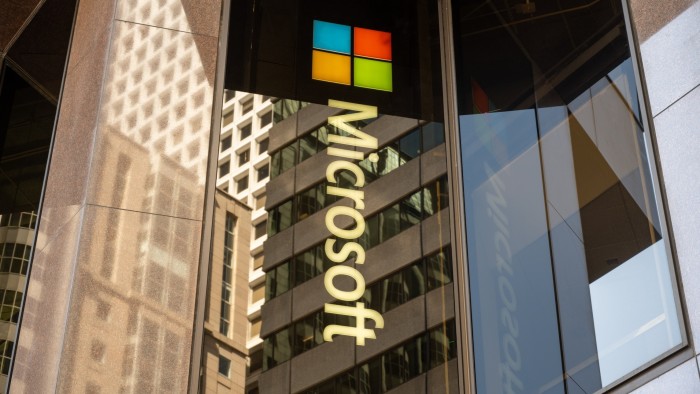Unlock the Editor’s Digest for free
Roula Khalaf, Editor of the FT, selects her favourite stories in this weekly newsletter.
Microsoft said its quarterly profits soared thanks to record revenues from its cloud computing division, with its market value poised to pass $4tn as investors reckon its massive investment in artificial intelligence is paying off.
Net income increased 24 per cent year on year to $27.2bn, surpassing analysts’ expectations for $25.3bn in the fourth quarter of Microsoft’s fiscal year, ending June 30.
Emboldened by evidence of AI accelerating earnings, chief financial officer Amy Hood said spending on data centres used to power the technology would increase further in the next 12 months.
She forecast $30bn of capital expenditures in the three months to September. That spending will continue thorough the year for an annual budget of $120bn, according to a person familiar with the plans — up from $88.2bn in 2025 and almost quadruple the $32bn in 2023.
Microsoft shares jumped about 8 per cent in after-hours trading.
The stock had risen 22 per cent this year ahead of the earnings report as the company is increasingly perceived by investors as a winner from the AI boom. Its stock market capitalisation of $3.8tn is second only to US chipmaker Nvidia. If the overnight move holds, it will be worth more than $4.1tn.
Chief executive Satya Nadella has repositioned the software giant in his 12 years in charge, building out its data centre business and in 2019 making an early bet on OpenAI — which has emerged as a market leader in the much-hyped technology.
The partnership gave Microsoft access to the start-up’s large language models, without having to shoulder the huge costs of training them in house. It has infused AI tools based on ChatGPT models throughout its corporate and consumer products.
The deal also secured exclusive rights to be OpenAI’s data centre provider, which has proved lucrative as its hunger for AI-related compute has grown.
However, the relationship with OpenAI has become strained, with the pair now embroiled in a contentious renegotiation of their agreement.
Microsoft has diversified beyond OpenAI for the AI models it offers on its cloud platform to Elon Musk’s Grok and Meta’s Llama series.
Earlier this year, investors questioned the wisdom of Nadella’s big gamble, selling off the stock as Microsoft’s cloud growth slowed and cheaper AI models from China raised doubts about the resilience of US computational demand.
Their fears have since subsided and executives say demand continues to outstrip supply, with the pace of investment matched to a backlog of customer orders for cloud computing.
“We are going through a generational tech shift with AI . . . We lead the AI infrastructure wave and took share every quarter this year,” Nadella said on a call with analysts. “We continue to scale our own data centre capacity faster than any other competitor.”
Microsoft revenue rose 18 per cent to $76.4bn in the quarter, exceeding the average $73.9bn estimate compiled by Visible Alpha and boosting its annual revenue to $282bn.
The company for the first time disclosed revenue specifically from its Azure cloud computing unit, which it said rose 34 per cent to a record $75bn in the company’s fiscal year, which ended in June.
In the fourth quarter, overall cloud revenue was $46.7bn, up from $36.9bn in the same period a year earlier.
“Azure revenue growth, which remains the major focal point to gauge the strength of its AI contribution, came in well above the Street’s expectations,” said Wedbush analyst Dan Ives.
Capital expenditure rose to $24.2bn in the quarter, up 27 per cent versus last year, and taking its spending in the past 12 months to $88.2bn, up from $55.7bn in fiscal 2024.
Recommended
Last week, rival Alphabet also boosted its AI spending plans by $10bn to $85bn this calendar year after its earnings from cloud computing jumped by almost a third.
Microsoft has seen strong adoption of its Copilot-branded AI chatbot that it has bundled with its Office suite of products, but has had far less success in the consumer market.
Nadella said its Copilot AI apps now had 100mn monthly commercial and individual users, but that trails Google’s Gemini with 450mn users and market leader ChatGPT, with more than 600mn.


